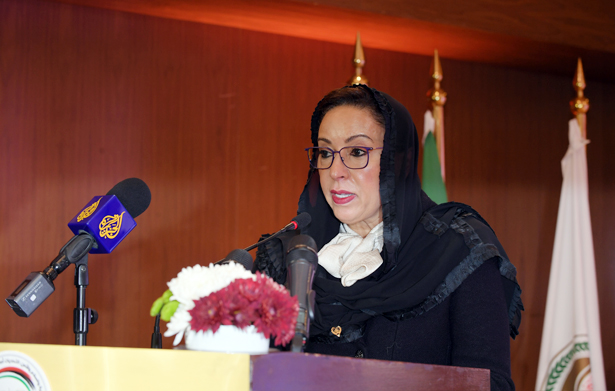Speeches of the Participants
Sheikha Fadyah S. Al-Sabah, Chairwoman of Kuwait Union of Women’s Associations.
"In the name of Allah, the Most Gracious, the Most Merciful,
Your Excellency Sheikh Jaber Al-Mubarak Al-Hamad Al-Sabah – Deputy Foreign Minister and representative of His Excellency the Foreign Minister in this conference,
Distinguished guests
Representatives of international and regional organizations,
Ladies and Gentlemen
Esteemed audience
Peace be upon you and the mercy of Allah and His blessings.
We are delighted to welcome the participants in this regional conference on Arab women, peace, and security. The challenges facing women in the Arab world under the slogan 'Stop the War on Gaza... Now, Not Tomorrow' are considerable.
At the outset of this conference, we would like to express our gratitude to His Excellency Ambassador Abdullah Al-Yahya, the Foreign Minister, for sponsoring this conference, represented by His Excellency Sheikh Jaber Al-Mubarak Al-Hamad Al-Sabah at the opening ceremony. We also want to convey our great appreciation to the Arab Women Organization for their noble efforts in advancing women's rights. We cannot overlook the historical and legitimate political stance since 1948 with the Palestinian people and their just demands, as well as the popular sentiment expressed by various segments of Kuwaiti society.
Therefore, we carefully chose the theme of this conference, held amid volatile global conditions across multiple parts of our Arab world. Foremost among these is the aggression against Gaza, occurring during a period where humanity faces various tensions and conflicts, making our discussion today about the role and status of women in the concept of human security and peace essential, urgent, and crucial.
The political situation has evolved in the last twenty years, with wars and internal conflicts exacerbating. After 75 years and more than 100 days, the aggression against Palestinians continues. With technological advancements in warfare, the economic and human toll is increasingly devastating, particularly impacting women. During wars, demanding change and enforcing women's rights becomes challenging, as the general situation and the fate of the country take priority. Women face greater levels of violence during and after conflicts. Humanitarian aid and international assistance rarely consider the daily reality of women. Moreover, the limited contributions from governments rarely prioritize the qualitative dimension in planning and execution. The United Nations Development Programme report highlights that women bear the brunt of occupation and wars, as seen in Palestine, Yemen, Sudan, and other conflict-affected countries.
Protecting women and ensuring their rights during war starts in peacetime through legal reforms, integrating the concept of gender equality into the workings of government and civil institutions, and developing programs to change stereotypes about women and their value as human beings.
We take this opportunity to salute and honor the resilient and steadfast Palestinian women, their limitless sacrifices, and self-denial in confronting the occupier's arrogance and crimes amid challenging circumstances.
Ladies and Gentlemen,
The Beirut Declaration for Arab Women in 2004 stated that equality and development cannot be achieved in the absence of peace. The main obstacle facing women is occupation, settlement, and threats. It called on Arab governments to remove political and security obstacles hindering societal and women's progress, develop strategies for women's empowerment, increase budgets and human resources for women-focused programs, allocate a share for women in official and legislative institutions to enhance their political participation, include gender equality in development policies, pay necessary attention to girls' and women's education, eliminate discriminatory images and ideas against women from books and media materials, empower and train women for leadership positions, and amend unfair laws against women.
The Arab Women and Armed Conflicts Forum held in Beirut in March 2004, in its final statement, pointed out that Arab women are the most affected by the consequences of occupations, wars, and armed conflicts. It recommended that countries and governments create special programs to support women in resisting occupation, provide material and moral assistance for resilience, raise social awareness about the destructive effects of armed conflicts, wars, and occupations on women, children, and families, enhance essential services to support women with special needs resulting from occupation and armed conflicts, as seen in Gaza today, Yemen, Sudan, and elsewhere, and enact legislation to ensure women's participation in public life.
Ladies and Gentlemen,
Everyone recognizes the importance of international conventions regarding human rights, especially those addressing the most vulnerable groups. This has undoubtedly led to adopting several concepts and approaches, including the concept of 'human security,' 'women's empowerment,' and 'children's rights.' However, everyone also realizes that international conventions and national legislation, no matter how significant, cannot alone achieve human security, including women's and children's security. It requires, alongside enacting appropriate legislation, ongoing programs to embed these principles in reality.
We are confident that the contribution of prominent figures attending this conference will open new horizons for women to contribute to comprehensive and sustainable development in our Arab countries, especially those suffering from occupation or unstable conditions.
As we wish this conference every success, we renew our welcome to all participants and wish everyone a pleasant stay in your second home, Kuwait.
Peace, mercy, and blessings of Allah be upon you."



